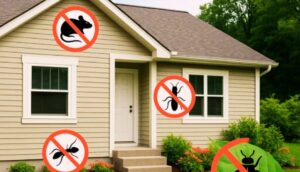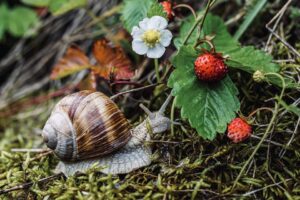How to Keep Squirrels Away

Squirrels are considered some of the quietest rodents, but as adorable and cuddly as they seem, they can become a nuisance when found in the home garden. Squirrels like other rodents search for food and a water source. These tiny creatures have great agility and move quickly from tree to tree. In the wild, a squirrel’s natural habitat consists of at least 50 to 75 nut and shelter trees, such as elm, hickory, mulberry, maple, pecan, and walnut trees.
They can also be found in open areas with well-drained soil, grasslands, and prairies. A squirrel’s diet consists of insects, fruits, nuts, grains, buds, flowers seeds. bark, roots, fungi, bulbs, and vegetables. Squirrels are also famous for raiding bird feeders and can even be seen at times running along telephone wires.
Squirrel Identification
Squirrels are small to medium in size with soft dense fur, they can be various colors from red, gray, black, and brown, these rodents have sharp claws, busy tails, and large eyes.
Signs that Squirrels Are in Your Garden
These signs may indicate that you have a squirrel in your garden.
- The soil of outdoor plant containers is dug out.
- Missing plants.
- Partly eaten flowers.
- Bite mark or missing fruits.
- Damage to bird feeders.
- Squirrel footprints squirrel’s footprints point forward and backward, their front paws have four narrow toes with tiny claws. Their rare pawas are larger and possess five distinct toes with a large heel pad.
- Nibbled seedheads.
- Golf ball-sized or smaller holes in planting beds.
- Outdoor furniture has chewd marks.
- Garbage bags that are ripped open.
- Garbage bags are scattered around your yard.
- Squirrel droppings range in colors from dark brown to black, have the appearance of a raisin, and are usually small, cylindrical pellets with tapered ends. They are typically around 1/4 – 1/2 inch in length.
Structural Damage Cause by Squirrels

A Squirrel getting inside your home can become a real issue because of server damage that can also be hazardous, here are some signs that a squirrel may be causing structural damage.
- Signs of chewed electrical wires.
- Roofline damage.
- Damage done to air vents.
- Nest in your insulation.
- Evidence of teeth marks in wood, walls, and wire.
- Wood chips can be seen scattered.
- Holes in your shingles.
- Chewed marks on the outer panels of your home.
9 Methods of Squirrel Control
1. Get a Dog- There is a saying that ” a dog is a man’s best friend”, why not get a dog or two and have them run freely? Dogs on spotting squirrels will give them a scare chasing them away.
2. Motion sprinklers- Installing a motion sprinkler system with a sensor that turns on when motion is detected is a great way to give squirrels a surprising wet scare. Another advantage of a motion detector sprinkler system is keeping cats and other garden pests at bay for example voles, gophers, groundhogs, deer, chipmunks, rats, mice, etc… However, when using this method consideration must be taken so that family members who pass this area don’t get a surprisingly wet experience.
3. Using noise- Squirrels don’t like noise so why not install a motion detector device that automatically turns on when motion is detected? These devices will not only keep squirrels out but will also keep out other garden pests.
4. Use Decoys- Using decoys can help to squirrel-proof your garden, placing rubber snakes or plastic owls in your garden will help to scare them away. Move these decoys around every day, the addition of a noise motion detector will have squirrels on the run. For these products check your garden center, nursery, or hardware store.
5. Create a Barrier- Don’t let squirrels have a feast out of your crops before you have time to harvest them, cover your crops with row covers.
6. Keep Garden Tidy- A garden that’s nicely trimmed and always tidy can not only help to deter squirrels but rodents and other garden pests. Don’t allow any fallen fruits to remain on the ground including vegetables after harvest. Make sure each day that pet bowls don’t have leftover food which will attract squirrels.
7. Squirrel repellents- Can keep squirrels at bay, because of the active ingredient (predator urine) or (hot pepper) which can irritate both the eyes and the nose of squirrels. But these repellents do not come without their limitations because to remain effective reapplication is necessary. The reason for this is that once repellents are applied, water sunlight, and wind can cause repellents to breakdown.
8. Using odors: Some odors are a turn-off to squirrels, applying these odors in your garden will deter them, for example, vinegar and coffee grounds.
9. Install Plants that Squirrels hate: Interplanting plants with other plants is known a companion planting, the installation of these species will deter squirrels for example mint mustard, marigolds, nasturtiums, daffodil, crane’s-bill, fritillaries are few that squirrels detest.
Additional information
If you don’t want to take on the task of squirrel control you can always call in a professional pest control operator, this move will call for you to pay a fee but at least your squirrel issue would be brought under control.
10 Frequently Asked Questions (FAQs)
Conclusion
As cuddly and cute squirrels are there is much damage that can happen because of their destructive behavior, if you suspect that you have a squirrel issue based on what was discussed then move right away and take quick action to stop them in their tracks. This guide will help you to squirrel-proof your garden keeping them at bay. Join the many homeowners who are having success by using these methods. Why should your garden and home suffer at the hands of squirrels when you can put a few of these proven methods in place that work wonders?









